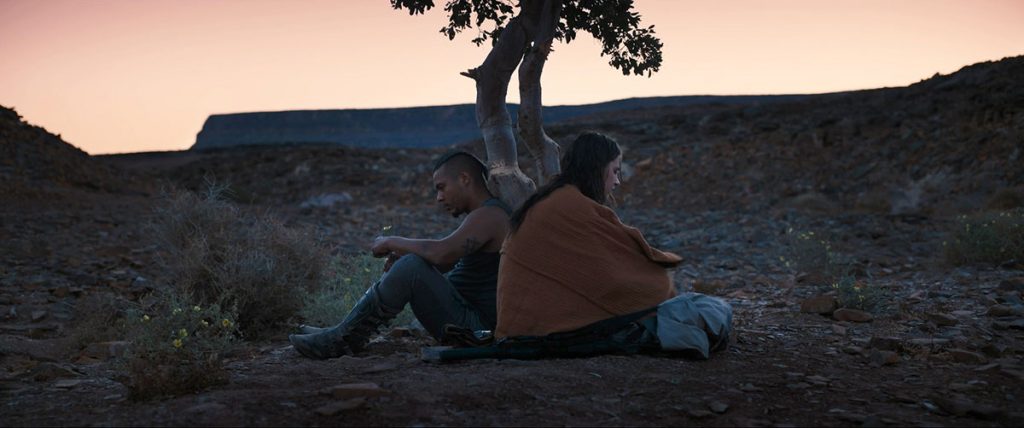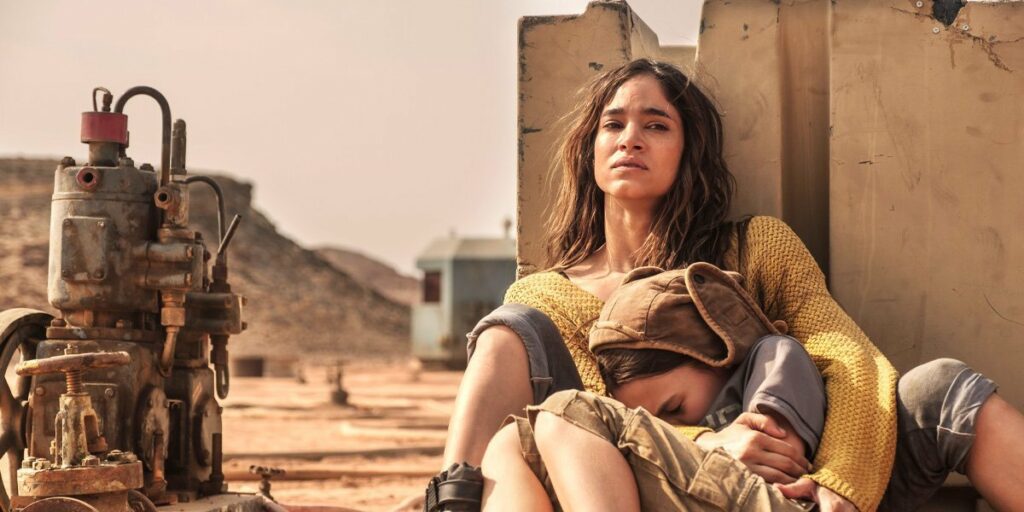The feature debut of Wyatt Rockerfeller, Settlers, is an introspective character piece disguised as sci-fi, that chooses intrigue over explanation and subtlety over adventure.
In a desert clearing, against the backdrop of the Martian frontier, a young family live on a remote farmstead. Their existence is a simple one, but a dark secret lurks beneath their seemingly idyllic life. When three strangers appear and try to oust them from their home, nine-year-old Remmy (Brooklyn Prince) is forced to confront the dangers her mother (Sofia Boutella) and father (Jonny Lee Miller) have kept from her and try to stay alive.
In his debut feature, writer/director Wyatt Rockefeller is assured and confident. Under the guise of a sci-fi, Settlers is actually much more focussed on introspection, on the strife of its characters, rather than the minutia of world-building. As the film begins, there lingers the suggestion that it’s a cat-and-mouse thriller, that the rest of the film will be an us-versus-them scenario with the family against the strangers outside. But Rockerfelller wrong-foots the audience almost immediately, and instead brings a stranger inside the circle and turns the film’s focus inward also.
Settlers starts in media res, and while little snippets of information are provided over the course of the film, a full explanation of what exactly the set-up is is not given to the audience. The film doesn’t linger on the ‘how’ or ‘why’: it doesn’t explain why they live where they do, or how they got there, or even specifically reference that it is in fact Mars they’re living on. Instead, its focus is entirely on character.
Remmy is a curious little girl, keen to explore the area beyond their farm’s boundary and learn about the other planets in the sky. Prince is precocious, her performance is riveting for such a young star and the transition into an older Remmy, played by Nell Tiger Free, isn’t jarring. Remmy’s is a childhood of trauma, and while Free’s young woman wears the weight of the girl’s suffering, the film doesn’t explore just how she has been affected in any real depth. There’s some shock and uncomfortable situations that reignite the curious spark that’s been dulled over time, and the film ends with Remmy being given the chance to explore more of the world outside her family bubble, but the lack of character exploration might leave some audiences wanting. (Thankfully, an explanation of how they’re able to breathe is given by Rockefeller, as that might have been one ask too many.)

Miller and Boutella are really effective in their roles, if underutilised. The family dynamic is presented straight-off-the-bat as naturalistic and engaging, which gives emphasis to the disruption and ensures the audience is firmly invested in the survival of these characters, despite not being presented with any significant backstory. Rounding out the cast is Ismael Cruz Córdova as Jerry, the stranger who infiltrates the farmstead with a vendetta and secret of his own. His performance is perhaps the most outwardly emotive throughout, and there’s a volatility to him that provides most of the tension in the second and third acts.
Overall, it’s a visually stunning film. Rockerfeller’s assuredness as a filmmaker is remarkable and the score – by Nitin Sawhney – imbues each emotive moment, be it tense or calm or poignant, with an affecting soundtrack that adds atmosphere and richness to a world kept, somewhat frustratingly, vague in regards to the narrative. Because Settlers is, ultimately, a character piece under the guise of a sci-fi. The contemplative nature of its pace and narrative might irritate some audiences looking for a more action-packed adventure, which might be understandable given the opening sequence and the marketing, but the end result is rewarding in a much more quiet manner for fans of slower, more introspective pieces.
Settlers is now available to watch on digital and on demand.

